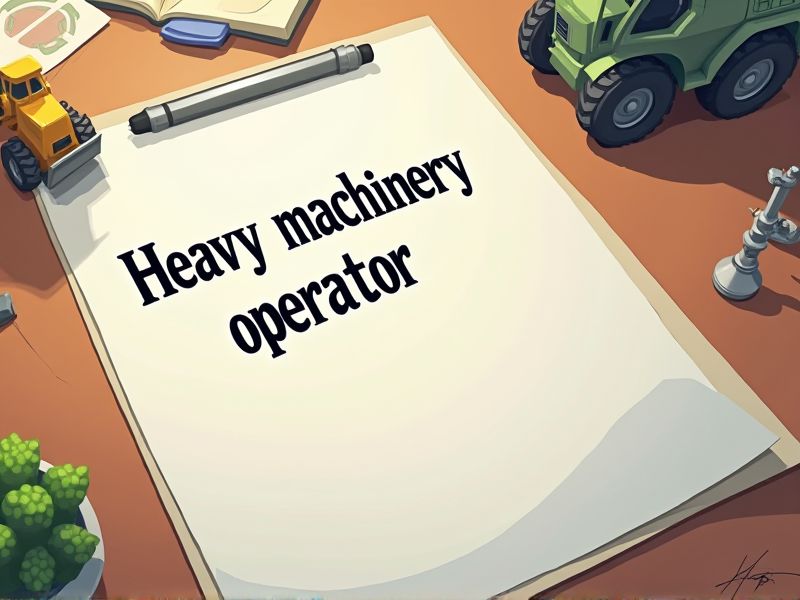
Heavy machinery operators handle equipment that can be dangerous without proper knowledge and skills, leading to potential safety hazards and operational inefficiencies. Certifications validate an operator's competence, ensuring that they meet industry standards and regulations. Employers often require certifications to minimize risks and enhance workplace safety. Some essential certifications you may need for operating heavy machinery include those specific to equipment type and relevant safety training.
Heavy Equipment Operator Certification
Heavy Equipment Operator Certification is required because it ensures operators have specialized knowledge to handle complex machinery safely, reducing the risk of workplace accidents. The certification verifies that operators are professionally trained to manage equipment efficiently, leading to increased productivity and precision in operations. Employers prioritize certified operators as it demonstrates compliance with industry standards and legal regulations, minimizing potential liabilities. Certification enhances an operator's credibility and marketability, opening up more job opportunities and career advancements within the construction and heavy machinery sectors.
OSHA 10-Hour Construction Safety Certification
Higher job safety standards are essential in construction, and the OSHA 10-Hour Construction Safety Certification ensures operators understand vital safety protocols. Proper training reduces the risk of accidents and injuries while operating heavy machinery in hazardous work environments. Employers benefit from reduced liability and potential insurance savings when their operators are OSHA certified. Operators armed with this certification are more likely to adhere to regulations, contributing to a safer workplace and enhancing overall productivity.
OSHA 30-Hour Construction Safety Certification
The OSHA 30-Hour Construction Safety Certification helps heavy machinery operators understand safety protocols, reducing the risk of workplace accidents. It provides operators with comprehensive knowledge about hazard recognition, leading to improved decision-making on-site. Employers often require this certification to ensure compliance with safety and health regulations. Enhanced safety awareness from the course can result in fewer incidents, thus lowering potential costs related to worker compensation and equipment damage.
Forklift Operator Certification
Forklift Operator Certification ensures operators understand safety protocols, reducing workplace accidents and injuries involving heavy machinery. Employers require certification to comply with Occupational Safety and Health Administration (OSHA) regulations, which mandate proper training and evaluation of forklift operators. Certified operators demonstrate proficiency, leading to increased productivity and efficiency in material handling tasks. Certification can enhance employment opportunities, as companies prefer skilled and knowledgeable personnel to mitigate liability risks.
Crane Operator Certification
Obtaining a crane operator certification ensures that heavy machinery operators possess the necessary skills and knowledge to operate cranes safely and efficiently. Certified operators demonstrate an understanding of industry standards and regulations, reducing the risk of accidents and enhancing workplace safety. Employers often require certification to comply with legal requirements and to mitigate liability concerns. Certified operators are generally more competitive in the job market, leading to better job prospects and potential for higher wages.
Rigging Certification
Rigging certification is necessary for heavy machinery operators because it ensures they possess the skills to safely lift and move large loads. Certification reduces the risk of accidents on job sites, which can result in injuries or damage to equipment. Employers are more likely to comply with regulatory requirements when operators are certified, which can prevent costly legal issues. Proper training enhances efficiency by allowing operators to execute tasks with precision.
Mobile Equipment Safety Certification
Mobile equipment safety certification ensures operators understand how to handle machinery safely, reducing the likelihood of accidents. It provides assurance that operators are familiar with current safety standards and regulations, enhancing workplace safety. This certification supports the identification and mitigation of potential hazards, preventing costly equipment damage. Employers benefit from a certified workforce, which translates into reduced liability and increased operational efficiency.
Confined Space Entry Certification
Heavy machinery operations frequently involve work in environments with limited ventilation and restricted exits, leading to higher risks of hazardous atmospheres. Confined Space Entry Certification equips operators with knowledge to identify potential dangers such as toxic gases or oxygen deficiency. Proper training ensures compliance with safety regulations, reducing the likelihood of accidents and enhancing overall workplace safety standards. Certified operators can execute emergency protocols effectively, mitigating the impact of unforeseen incidents.
First Aid/CPR/AED Certification
Heavy machinery operators frequently work in environments where accidents can happen, making first aid/CPR/AED certification essential to respond effectively to emergencies. Certification empowers operators to administer immediate care, potentially saving lives and reducing the severity of injuries. Often in remote or isolated locations, operators may be the first responders until professional medical help arrives. Companies may also require certification to meet occupational safety and health standards, decreasing liability and enhancing workplace safety.
Hazardous Materials (HAZMAT) Certification
Heavy machinery operators need HAZMAT certification because they often work in environments where hazardous materials are present, ensuring safety and legal compliance. The certification provides operators with essential training on handling and responding to potential chemical spills or leaks, mitigating environmental impact. Without proper certification, operators might lack the critical knowledge to prevent health risks associated with exposure to hazardous substances. Regulatory bodies often mandate HAZMAT certification as a requirement to operate machinery in industries like construction and mining, ensuring adherence to safety standards.
Summary
You will likely notice enhanced job prospects and higher earning potential after obtaining certifications as a heavy machinery operator. Employers often prioritize certified operators, which increases your chances of job security. With the advanced skills gained from certification, you can deliver improved efficiency and safety on the job site. Professional credentials can set you apart in a competitive workforce, leading to career advancement opportunities.
